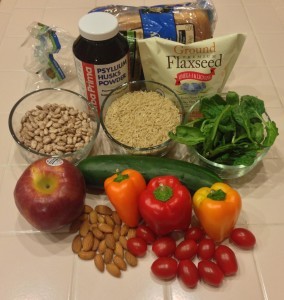The Importance of Fiber
The Importance of Fiber
 I’m often asked by my personal training clients how much protein, carbohydrates and fats are in certain foods, but little thought is given to how much fiber is in their diet. Fiber actually plays a very important role for not only weight loss but also in a person’s overall health.
I’m often asked by my personal training clients how much protein, carbohydrates and fats are in certain foods, but little thought is given to how much fiber is in their diet. Fiber actually plays a very important role for not only weight loss but also in a person’s overall health.
Types of Fiber
There are two types of fiber: soluble and insoluble. Soluble fiber dissolves in water. When combined with a liquid it expands to form a gel-like substance that slows digestion by delaying the emptying of the stomach. Insoluble fiber does not dissolve in water. It adds bulk to the diet helping food pass through the digestive tract relatively easy.
Benefits of Fiber
Fiber is very beneficial in a weight loss program because it adds bulk and substance to the diet which can help the stomach feel full. Since high fiber foods require more chewing and take longer to digest, this gives the brain time to register when it is full and makes it more likely that a person will not overeat. Fibrous foods are also an energy-dense food which means they are low in calories. You can eat a larger amount of food while consuming fewer calories.
Fiber also has many health benefits that help prevent the onset of dietary diseases. For people with diabetes, soluble fiber helps control blood sugar levels due to its slow absorption rate and insoluble fiber can help prevent the onset of type 2 diabetes. Soluble fiber can help lower overall cholesterol levels helping to reduce blood pressure and inflammation in the body. Fiber is also effective in preventing certain types of cancer, such as colon cancer, by helping the body maintain regular, normal bowel movements.
Amounts and Types of Fiber
The Institute of Medicine recommends that men younger than 50 consume 38 grams of fiber per day and men over 50 consume 30 grams of fiber per day. For women under 50 the recommended amount is 25 grams of fiber per day and for women over 50 it is 21 grams of fiber per day.
Soluble fiber can be found in foods such as oatmeal or oat cereals, apples, oranges, flaxseed, psyllium, beans, cucumbers, celery and carrots.
Insoluble fiber can be found in foods such as whole grains, whole wheat, brown rice, broccoli, dark leafy vegetables, and the skins of many edible fruits and vegetables.
For more information about the importance of fiber, losing weight, strength training, or if you’ve been thinking about hiring a personal trainer, contact us.

